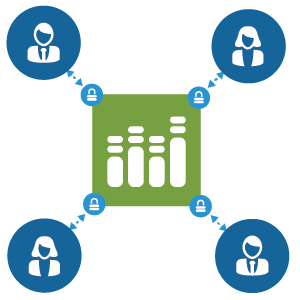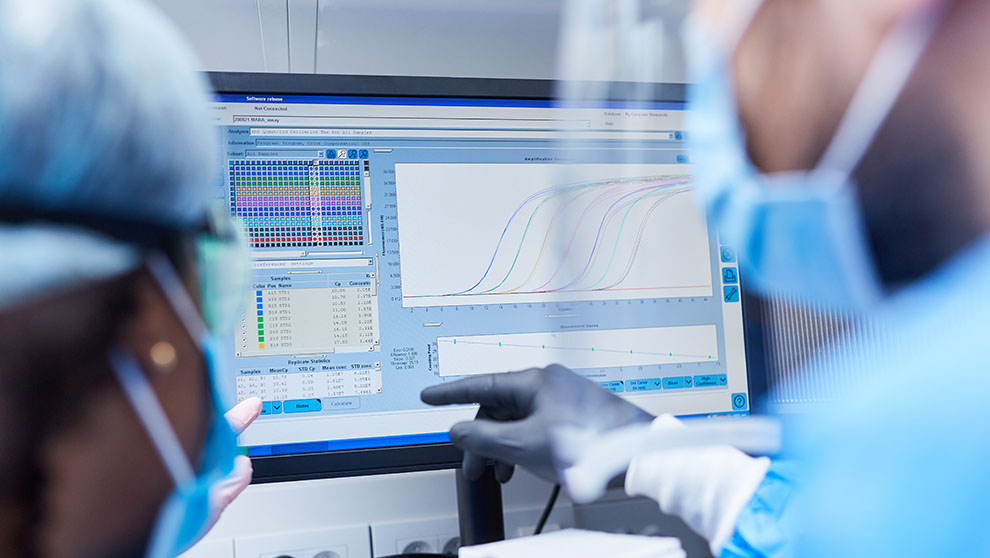Tag: Server SDMS
What is an EDC Platform for Clinical Trials?
For researchers, clinical data management and reporting has historically included manual curation and compilation of datasets from disparate data warehouses. In today’s data-rich environment, manual processing and integration is becoming more and more of a bottleneck.
In order to keep up with the increasing amount of data collected from clinical research, clinicians and statisticians alike need software tools that will centralize their data and help them quickly recognize errors. LabKey Server provides essential tools to overcome these, and other key clinical research challenges including:

Maintaining Clinical Data Integrity
Having an accurate representation of clinical data helps transform discoveries and understanding into patient care and treatment. Centrally-housing data in a compliant environment that enforces data standardization can help clinicians maintain excellent data integrity and provide an authoritative view of their data landscape.
LabKey Server helps maintain data integrity by providing:
- A highly structured data environment with enforceable data fields to ensure data is entered correctly and within range
- Quality control measures such as data flags, QC of datasets and built-in QC reports
- Role and group-based permission levels that allow users only access to what they need access to
- A compliance module, the allows users to set PHI securities, set Terms of Use for users, and provide electronic signatures on data snapshots
 Integration of Data from Multiple Sources
Integration of Data from Multiple Sources
Bringing together data from disparate sources into a single system can help clinical research stay on track and on time. Collaborative monitoring of data quality by clinicians, statisticians, and scientists enables quick identification of erroneous data and ensures a reliable, integrated data landscape for comprehensive data analysis.
LabKey Server helps facilitate comprehensive data integration by providing:
- Management of lab data together with clinical data in a single system
- A study module that can recognize and integrate disparate vendor datasets
- Built-in and customizable integration with electronic data capture systems and case report forms
- A clinical document abstraction pipeline, which can extract valuable data from legacy documents
 Secure Reporting and Collaboration
Secure Reporting and Collaboration
A key component of effective clinical data management is the ability to share reports and data with collaborators to improve research, innovation, and ultimately patient care. Maintaining compliance and having the ability to quickly share data and reports is an important topic to tackle in clinical research where patient safety and care is the top priority.
LabKey Server improves reporting and collaboration by providing:
- Dynamic and static reporting tables and visualizations that can be shared as-needed
- Web-based access to a central platform for data sharing
- The ability to remove PHI fields or provide randomized IDs when sharing information with collaborators
With the right tools for clinical data management, research teams can eliminate data integration bottle necks and curate reliable datasets for analysis. Explore our example Longitudinal Study or Sign-up for a free trial to see how LabKey Server can help your team overcome these, and other common clinical research challenges.
Related Documentation
Read more about the features highlighted above on the LabKey Support Portal:
How to Choose the Best Laboratory Data Management Software for Your Lab
For researchers, clinical data management and reporting has historically included manual curation and compilation of datasets from disparate data warehouses. In today’s data-rich environment, manual processing and integration is becoming more and more of a bottleneck.
In order to keep up with the increasing amount of data collected from clinical research, clinicians and statisticians alike need software tools that will centralize their data and help them quickly recognize errors. LabKey Server provides essential tools to overcome these, and other key clinical research challenges including:

Maintaining Clinical Data Integrity
Having an accurate representation of clinical data helps transform discoveries and understanding into patient care and treatment. Centrally-housing data in a compliant environment that enforces data standardization can help clinicians maintain excellent data integrity and provide an authoritative view of their data landscape.
LabKey Server helps maintain data integrity by providing:
- A highly structured data environment with enforceable data fields to ensure data is entered correctly and within range
- Quality control measures such as data flags, QC of datasets and built-in QC reports
- Role and group-based permission levels that allow users only access to what they need access to
- A compliance module, the allows users to set PHI securities, set Terms of Use for users, and provide electronic signatures on data snapshots
 Integration of Data from Multiple Sources
Integration of Data from Multiple Sources
Bringing together data from disparate sources into a single system can help clinical research stay on track and on time. Collaborative monitoring of data quality by clinicians, statisticians, and scientists enables quick identification of erroneous data and ensures a reliable, integrated data landscape for comprehensive data analysis.
LabKey Server helps facilitate comprehensive data integration by providing:
- Management of lab data together with clinical data in a single system
- A study module that can recognize and integrate disparate vendor datasets
- Built-in and customizable integration with electronic data capture systems and case report forms
- A clinical document abstraction pipeline, which can extract valuable data from legacy documents
 Secure Reporting and Collaboration
Secure Reporting and Collaboration
A key component of effective clinical data management is the ability to share reports and data with collaborators to improve research, innovation, and ultimately patient care. Maintaining compliance and having the ability to quickly share data and reports is an important topic to tackle in clinical research where patient safety and care is the top priority.
LabKey Server improves reporting and collaboration by providing:
- Dynamic and static reporting tables and visualizations that can be shared as-needed
- Web-based access to a central platform for data sharing
- The ability to remove PHI fields or provide randomized IDs when sharing information with collaborators
With the right tools for clinical data management, research teams can eliminate data integration bottle necks and curate reliable datasets for analysis. Explore our example Longitudinal Study or Sign-up for a free trial to see how LabKey Server can help your team overcome these, and other common clinical research challenges.
Related Documentation
Read more about the features highlighted above on the LabKey Support Portal:
Navigating Your Options in Scientific Informatics Software
For researchers, clinical data management and reporting has historically included manual curation and compilation of datasets from disparate data warehouses. In today’s data-rich environment, manual processing and integration is becoming more and more of a bottleneck.
In order to keep up with the increasing amount of data collected from clinical research, clinicians and statisticians alike need software tools that will centralize their data and help them quickly recognize errors. LabKey Server provides essential tools to overcome these, and other key clinical research challenges including:

Maintaining Clinical Data Integrity
Having an accurate representation of clinical data helps transform discoveries and understanding into patient care and treatment. Centrally-housing data in a compliant environment that enforces data standardization can help clinicians maintain excellent data integrity and provide an authoritative view of their data landscape.
LabKey Server helps maintain data integrity by providing:
- A highly structured data environment with enforceable data fields to ensure data is entered correctly and within range
- Quality control measures such as data flags, QC of datasets and built-in QC reports
- Role and group-based permission levels that allow users only access to what they need access to
- A compliance module, the allows users to set PHI securities, set Terms of Use for users, and provide electronic signatures on data snapshots
 Integration of Data from Multiple Sources
Integration of Data from Multiple Sources
Bringing together data from disparate sources into a single system can help clinical research stay on track and on time. Collaborative monitoring of data quality by clinicians, statisticians, and scientists enables quick identification of erroneous data and ensures a reliable, integrated data landscape for comprehensive data analysis.
LabKey Server helps facilitate comprehensive data integration by providing:
- Management of lab data together with clinical data in a single system
- A study module that can recognize and integrate disparate vendor datasets
- Built-in and customizable integration with electronic data capture systems and case report forms
- A clinical document abstraction pipeline, which can extract valuable data from legacy documents
 Secure Reporting and Collaboration
Secure Reporting and Collaboration
A key component of effective clinical data management is the ability to share reports and data with collaborators to improve research, innovation, and ultimately patient care. Maintaining compliance and having the ability to quickly share data and reports is an important topic to tackle in clinical research where patient safety and care is the top priority.
LabKey Server improves reporting and collaboration by providing:
- Dynamic and static reporting tables and visualizations that can be shared as-needed
- Web-based access to a central platform for data sharing
- The ability to remove PHI fields or provide randomized IDs when sharing information with collaborators
With the right tools for clinical data management, research teams can eliminate data integration bottle necks and curate reliable datasets for analysis. Explore our example Longitudinal Study or Sign-up for a free trial to see how LabKey Server can help your team overcome these, and other common clinical research challenges.
Related Documentation
Read more about the features highlighted above on the LabKey Support Portal:
Basics of Drug Discovery Software for Early Stage Biotechs
For researchers, clinical data management and reporting has historically included manual curation and compilation of datasets from disparate data warehouses. In today’s data-rich environment, manual processing and integration is becoming more and more of a bottleneck.
In order to keep up with the increasing amount of data collected from clinical research, clinicians and statisticians alike need software tools that will centralize their data and help them quickly recognize errors. LabKey Server provides essential tools to overcome these, and other key clinical research challenges including:

Maintaining Clinical Data Integrity
Having an accurate representation of clinical data helps transform discoveries and understanding into patient care and treatment. Centrally-housing data in a compliant environment that enforces data standardization can help clinicians maintain excellent data integrity and provide an authoritative view of their data landscape.
LabKey Server helps maintain data integrity by providing:
- A highly structured data environment with enforceable data fields to ensure data is entered correctly and within range
- Quality control measures such as data flags, QC of datasets and built-in QC reports
- Role and group-based permission levels that allow users only access to what they need access to
- A compliance module, the allows users to set PHI securities, set Terms of Use for users, and provide electronic signatures on data snapshots
 Integration of Data from Multiple Sources
Integration of Data from Multiple Sources
Bringing together data from disparate sources into a single system can help clinical research stay on track and on time. Collaborative monitoring of data quality by clinicians, statisticians, and scientists enables quick identification of erroneous data and ensures a reliable, integrated data landscape for comprehensive data analysis.
LabKey Server helps facilitate comprehensive data integration by providing:
- Management of lab data together with clinical data in a single system
- A study module that can recognize and integrate disparate vendor datasets
- Built-in and customizable integration with electronic data capture systems and case report forms
- A clinical document abstraction pipeline, which can extract valuable data from legacy documents
 Secure Reporting and Collaboration
Secure Reporting and Collaboration
A key component of effective clinical data management is the ability to share reports and data with collaborators to improve research, innovation, and ultimately patient care. Maintaining compliance and having the ability to quickly share data and reports is an important topic to tackle in clinical research where patient safety and care is the top priority.
LabKey Server improves reporting and collaboration by providing:
- Dynamic and static reporting tables and visualizations that can be shared as-needed
- Web-based access to a central platform for data sharing
- The ability to remove PHI fields or provide randomized IDs when sharing information with collaborators
With the right tools for clinical data management, research teams can eliminate data integration bottle necks and curate reliable datasets for analysis. Explore our example Longitudinal Study or Sign-up for a free trial to see how LabKey Server can help your team overcome these, and other common clinical research challenges.
Related Documentation
Read more about the features highlighted above on the LabKey Support Portal:
What Is a Scientific Data Management System?
SDMS vs LIMS: Which Is Right for Your Research?
5 Essential Bioinformatics Tools for Immunotherapy
How Does Bioinformatics Software Help Cancer Research?
NIH Data Management & Sharing Policy
The biologics development process is a data-driven endeavor. A vast amount of data is generated from many teams with the hopes of answering questions and informing decision-making along the way. Centralizing this data and their analyses across experiments amplifies the power and impact that data has on biologics research and development.
Of course, centralizing biologics assay data means much more than simply storing data in the same place. Data centralization increases the value of biologics data beyond one particular experiment or result by defining data relationships. The ability to aggregate data across multiple samples, assays, and experiments, with metadata describing the relationship of all of these to each other, is where modern data science resides. Whereas the analysis of a single value from a single assay shows a distribution, joining that assay with others reveals a richer data landscape that is ripe for analysis. These data landscapes yield even more insights when they are related to one another across many controlled variables and conditions.
Below are more ways that implementing tools and strategies for data centralization can impact the speed and efficiency of biotherapeutic development.
Data Integrity
Having a single source of truth for data makes it easier for organizations to track how (and by whom) data is generated, accessed, and modified. With the assistance of a biologics data management application serving as a central hub- permissions, auditing, and backups provide control over how, when, where, and by whom data is used. Centralization of data also encourages standardization of data formats across research teams. Standardizing data structures helps validate the data being entered and helps preserve the relationships between data. This leads to downstream efficiency and maximizes the utility of experiments beyond the individual or team from which it was derived.
Collaboration
Centralizing biologics research data also helps promote collaboration between research teams. By storing data in one central location in standardized formats, scientists can easily find, compare and reference existing data in their research. A central repository for data also makes it much easier to see what data is missing or needed to inform decisions. Hand-offs of data are also made easier when all data is centrally stored.
About our Biologics LIMS
LabKey Biologics provides researchers with a set of tools to centralize biological entity registration, workflow management, and data exploration.
- Bioregistry – Register and track molecular entities, nucleotide sequences, protein sequences, expression systems, constructs, vectors, and cell lines
- Biologics Assay Management – Connect design data to related multi-dimensional assay results for a complete data landscape.
- Biologics Workflow Manager – Centrally manage biologics development workflows to help your team collaborate
- Electronic Lab Notebook – Highlight and connect your research entities and data with our biologics ELN
Click Here to take a tour of LabKey Biologics.









